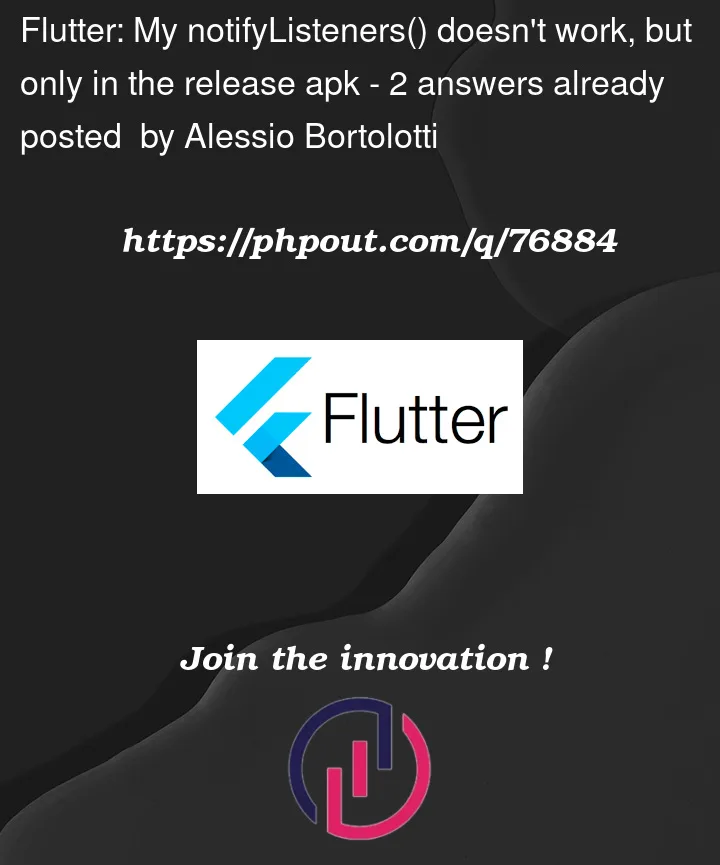I have a page that shows a loading while making my API call, and once the call is done it shows the received data.
On debugger everything works correctly, but when I create the apk with ‘flutter build apk’, and download it, the loading remains indefinitely.
I also put a showDialog at the end of my Provider function that makes the API call (I put this showDialog just below notifyListeners().
I can’t understand why in debug it works and in release it doesn’t.
(This notifyListeners thing not working just does it for every API call I make)
This is the code of the provider function that makes the api call:
Future<void> getUserSites(context) async {
_userSites.clear();
isLoading = true;
notifyListeners();
try {
final response = await NetworkService.call(
url: '/api/structure/Sites',
method: Method.Get,
context: context) as List<dynamic>;
for (var i = 0; i < response.length; i++) {
_userSites.add(Sites.fromJson(response.elementAt(i)));
}
if (defaultSite == null) {
if (SimplePreferences.getDefaultSite() == null) {
defaultSite = _userSites.isNotEmpty ? _userSites.first : null;
if (defaultSite != null) {
SimplePreferences.setDefaultSite(defaultSite!.id);
}
} else {
defaultSite = _userSites.firstWhere(
(element) => element.id == SimplePreferences.getDefaultSite()!);
}
}
} catch (e) {
inspect(e);
if (SimplePreferences.getToken() != null) {
showDialog(
context: context,
builder: (ctx) => AlertDialog(
title: const Text('General Error'),
content: Text(e.toString()),
actions: [
TextButton(
onPressed: () {
Navigator.of(context).pop();
},
child: const Text(
'Ok',
),
)
],
),
);
}
// throw e;
}
isLoading = false;
notifyListeners();
showDialog(
context: context,
builder: (ctx) => AlertDialog(
title: const Text('getUserSites done!'),
content: Text(_userSites.toString()),
actions: [
TextButton(
onPressed: () {
Navigator.of(context).pop();
},
child: const Text(
'Ok',
),
)
],
),
);
}
this is the Home page code:
class HomePageScreen extends StatelessWidget { const HomePageScreen({super.key}); static const String routeName = '/';
@override Widget build(BuildContext context) { log('New Page: Home Page'); final provider = Provider.of<MyManager>(context);
return provider.isLoading ? const Center(
child: CircularProgressIndicator(),
)
: SingleChildScrollView(
physics: const BouncingScrollPhysics(),
child: Container(
child: Column(
mainAxisAlignment: MainAxisAlignment.center,
children: [
MainButton(
onTap: () async {
Navigator.of(context)
.pushNamed(ShowPatrolScreen.routeName);
await provider.getPatrol(context);
},
icon: Icons.home,
title: 'ShowPatrol',
),
printSito(provider.defaultSite?.description ?? 'Nessun Sito', context),
PrintRequestZ(
showCompleted: false,
),
],
),
),
);
}
Widget printSito(String name, context) { .... //pass context for Navigator and Theme } } `
this is the main page:
...
final myScreens = [
const HomePageScreen(),
...
];
@override
void initState() {
// TODO: implement initState
super.initState();
print('token: ${SimplePreferences.getToken()}');
if (SimplePreferences.getToken() == null){
Navigator.of(context).pushReplacementNamed('/Auth');
}
var provider = Provider.of<MyManager>(context, listen: false);
provider.setAll(context); //this function calls all my API calls, but for testing, I commented out all other functions and kept only the one written above
}
@override
Widget build(BuildContext context) {
var provider = Provider.of<MyManager>(context);
return Scaffold(
appBar: const MyAppBar(title: 'Ronda',canGoBack: false,),
body: myScreens[currentPage],
bottomNavigationBar: ...
),
}
Thanks in advance!




2
Answers
after some research i found the solution. You have to use
WidgetsBinding.instance.addPostFrameCallbackin the parent component. So my home page now looks like this:I don't quite understand why though. If someone could explain it to me, I'd be very happy
Use Consumer to access the Provider’s Variable